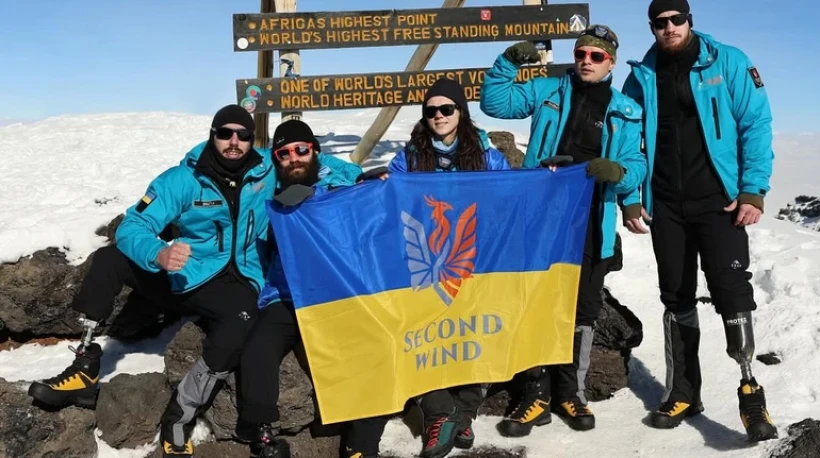
Returning from war is different for everyone. Some people can quickly return to their normal lives, while others need time to get used to new conditions and rapid changes.
But whatever the return is like, sport helps to ease the transition by restoring strength, confidence, and the feeling that you are back in control of your life. It is also one of the main tools for rehabilitation and recovery after illness, injury, wounds, or long service.
Adaptive sports can be useful for some defenders — training that helps them remain active in life and the community despite their injuries.
Or war veterans' sports — a whole movement that brings together veterans, their families, and becomes a space for community support and unity, an opportunity to train professionally and even compete in national and international competitions.
In this article, we have collected stories of those who, through sports — adaptive or veteran — were able to recover, find new meaning, and gain additional support. We will also tell you how to join such opportunities.
What is adaptive sports and how can it help veterans?
After returning to civilian life, veterans enter a phase where they need to establish a new routine and take responsibility for their physical and emotional well-being. This is the ideal time to reintegrate sports into their lives, either for the first time or in a new way.
"It is important to understand that a person who has been injured or has simply served in the military for a long time and has the 'standard set' of military problems (back problems, concussion effects, etc.) in order to continue living a quality life, needs to move much more than they did before serving," says Taras Kovalik, head of the veterans department at the Come Back Alive Foundation.
Taras is a veteran himself. In 2014, during the liberation of the city of Schyastya in the Luhansk region, he was wounded by a bullet.
"As a person with a disability, I have already learned that if I don't train in the gym or play sports, I become a hospital patient and have to undergo systematic treatment," the veteran shares. "To prevent this from happening, I have to exercise regularly. That's why I encourage us veterans to move more and find what suits us best among the various types of adaptive sports and beyond."
Adaptive sports are activities organized by sports facilities and organizations that provide conditions for people with disabilities or limitations in their daily functioning to comfortably participate in active sports, both individually and in teams.
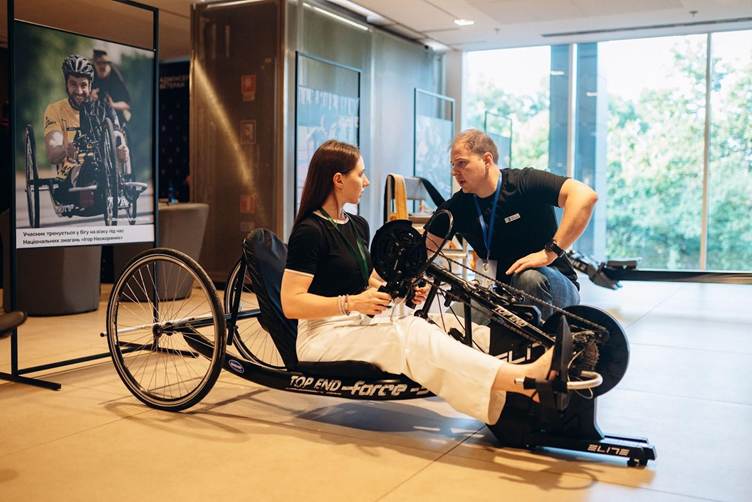
Taras Kovalik, head of the veterans department at the Come Back Alive Foundation, talks about the possibilities of handcycling. Photo: Center for Initiatives PZ
Virtually any sport can be adapted to a specific group of people, depending on their abilities: for example, hand volleyball or wheelchair basketball, hand cycling, rowing on exercise machines, athletics and wheelchair rugby, boccia, etc.
Adaptive sports give veterans with disabilities the opportunity not only to systematically strengthen their bodies, but also to find a community with similar interests and a place where they can realize their ambitions.
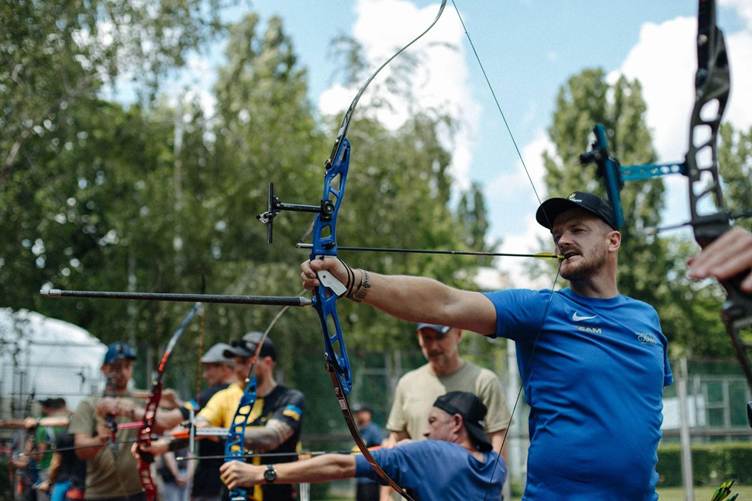
Adaptive archery. Photo from the Center for Initiatives PZ website, author Tim Pushkaruk.
Next, we share the stories of Ukrainian military personnel who have been helped by sport to recover physically and mentally after serious injuries.
Olga "Vysota": sport helped her return to the ranks and climb Kilimanjaro.
Until February 2022, Olga Yegorova, a master of sports in weightlifting from Dnipropetrovsk, worked as a coach.
On the first day of the full-scale invasion, she joined the Kyiv region's territorial defense forces. Then, for the first time in many years, sport completely disappeared from her life.
"It was possible to go for a run or warm up between shifts, but I couldn't imagine doing that when everything around me looked like the apocalypse. I felt like I was losing touch with my body day by day," Olga recalls.
Only a few months later, when the Kyiv region was liberated, did she allow herself to go out for short workouts. At the same time, the question arose about her future path, as volunteer battalions began to be disbanded and integrated into the Armed Forces of Ukraine.
"With training, I regained control over my body. I had a fighting spirit and a feeling of great strength inside me. And I submitted my documents to join the Armed Forces of Ukraine," says Olga.
The woman joined the Surma Team, where she received the call sign "Height."
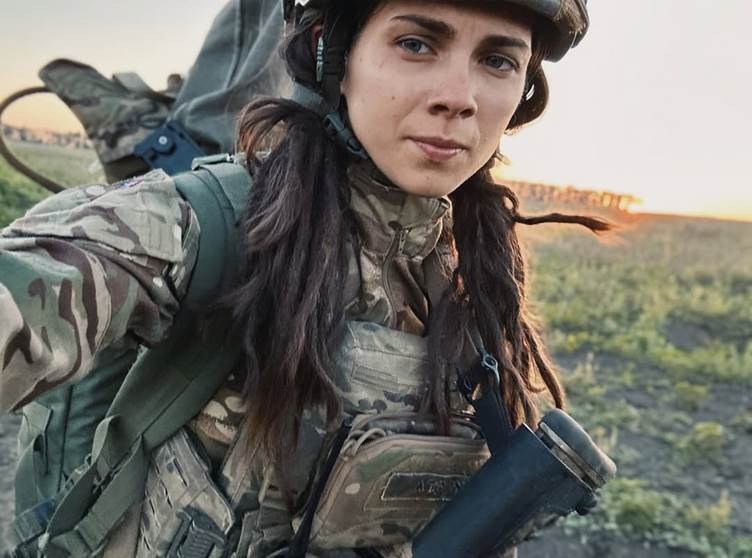
Surma Team soldier Olga "Vysota" Yegorova. Photo by Olga
In 2023, the soldier was wounded during combat operations. A fragment of an enemy shell hit her in the stomach. Olga underwent several operations, but the hardest test for her was being forced to remain bedridden.
"I couldn't accept the fact that I wouldn't be able to move for some time. I understand those who feel trapped in the hospital. You are locked in a circle of possibilities: lying down, eating, turning over — and that's it. If you have to just lie there for weeks, it's easy to drive yourself into a psychological hole, which feels even worse than the physical effects of the injury," she tells Vysota. "I felt better when my brothers-in-arms first came to visit: they talked about their successes and failures. And something else appeared in my head again, besides pain and self-pity. I felt that my life was in my hands."
Olga resumed light training even before the wound on her stomach had completely healed. And after rehabilitation, she immediately returned to service.
At the end of 2024, Vysota received an invitation to join a group of Ukrainian soldiers with prosthetic legs who were going to climb Africa's highest mountain, Kilimanjaro. The expedition was organized as part of the media project "Second Breath."
До старту залишалося 4 місяці, тож Ольга готувалась до сходження у перервах між бойовими виїздами.
On February 1, 2025, Olga, along with four active military personnel and veterans with lower limb prostheses, climbed Africa's highest peak and planted the Ukrainian flag there. 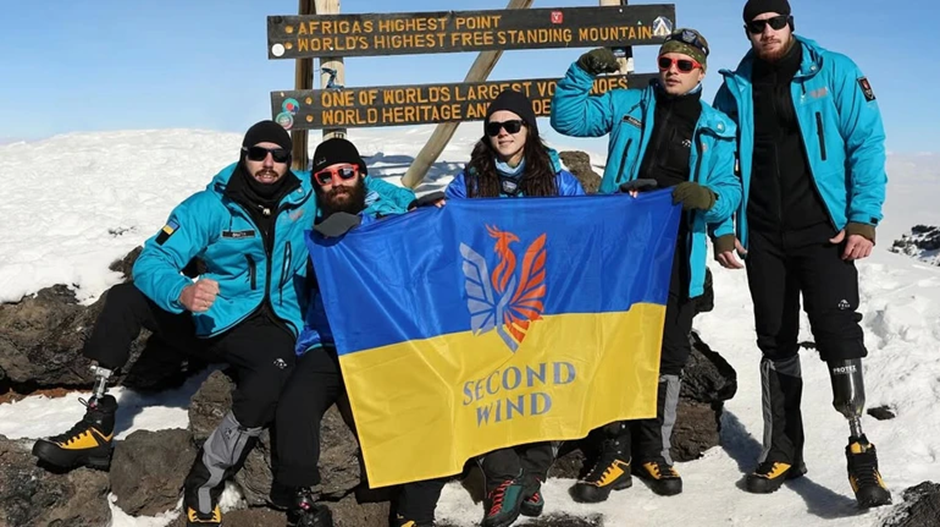
Surma Team soldier Olga "Vysota" Yegorova and four veterans with prosthetic limbs at the summit of Kilimanjaro. Photo: "Second Wind"
"Whatever you do — whether it's jogging or stretching — it's a very valuable feeling that you're doing something right for yourself. And it's also about self-confidence. Once you overcome laziness and weakness, you start to respect yourself. And that then affects your whole life," says Olga.
Roman "Dobryak": boxing and somersaults on one leg
When the invasion began, Roman Kolesnik, a mixed martial arts (MMA) coach and Kyiv Dynamo ultras fan, immediately joined the defense of the country.
In May 2022, the athlete with the call sign "Dobryak" attacked enemy positions as part of the 3rd Assault Brigade.
"A tank was firing at our group. The third shell landed near me and my comrade. My right leg was literally torn apart below the calf," recalls Dobryak. "When the doctors gathered around my bed in the hospital in Pokrovsk with sad faces, I immediately understood everything. I told them, 'Cut it off. I understand. It's okay.'
The very next day after the amputation, I asked the doctor if I could move around on crutches. I really didn't want to sit in a wheelchair, even for a short time."
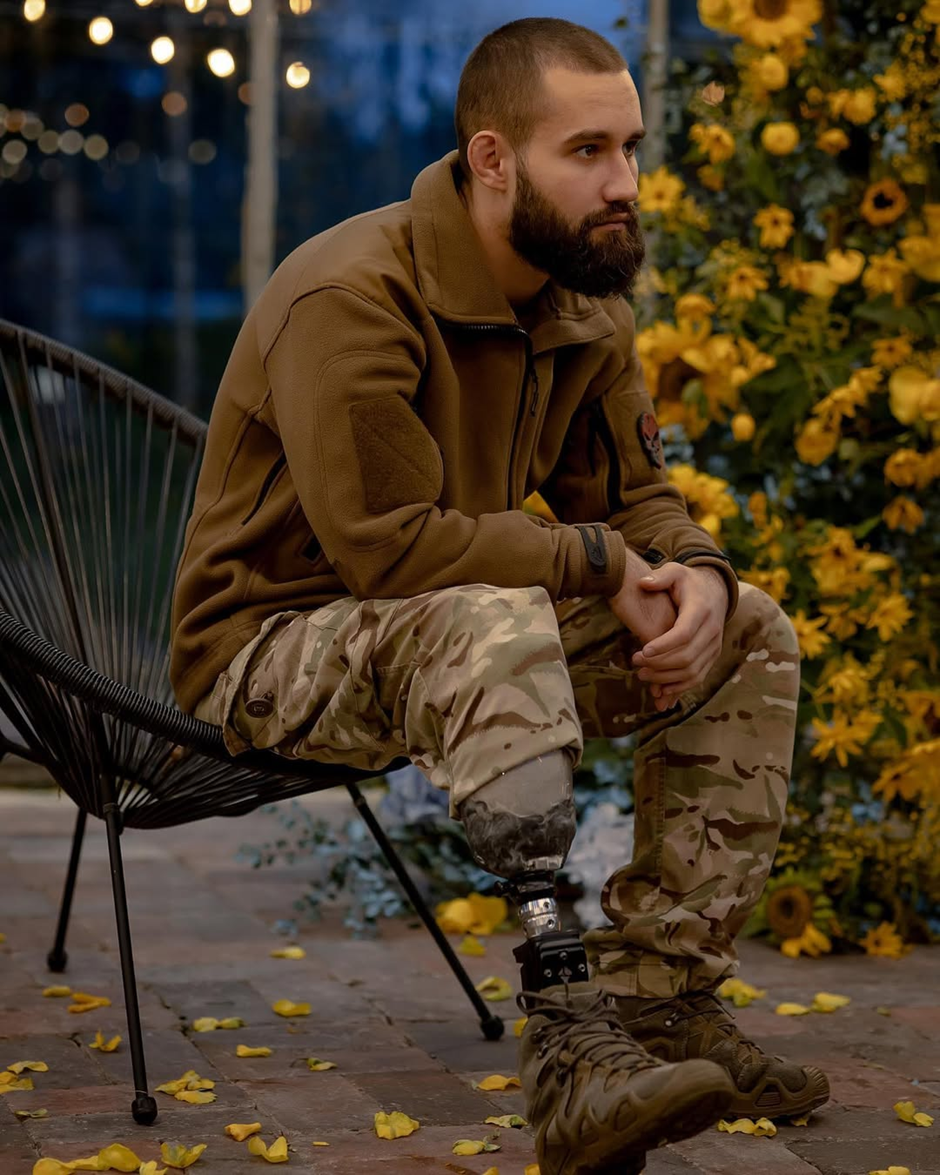
War veteran Roman "Dobryak" Kolesnik. Photo from Roman's page
In total, "Dobryak" underwent 10 operations. Despite the doctors' warnings, he resumed training while still in the hospital: he did push-ups and boxed on one leg.
"I set myself a goal: I will do somersaults again. Even when I didn't have a prosthesis, I went to a trampoline park in Kyiv and did this trick.
I started boxing again. Now I train in Ivano-Frankivsk alongside professional boxers who are preparing for championships. When you are around people who are stronger than you, you become stronger yourself," the veteran is convinced.
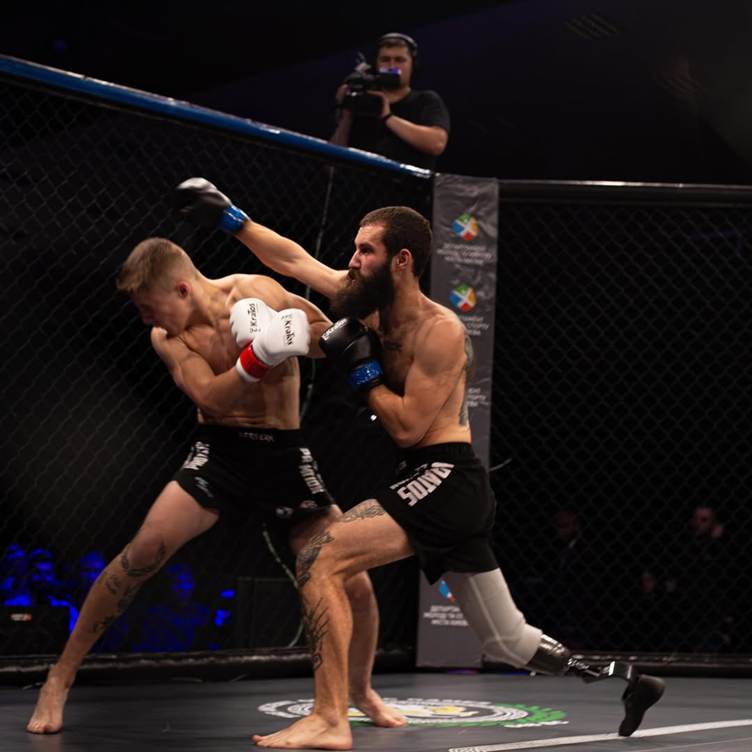
Roman "Dobryak" Kolesnik (right) boxing in the ring. Photo from Roman's page
Roman competed in the ring as an MMA fighter for many years, but even such an experienced fighter has days when his enthusiasm wanes.
"I don't want to do anything — I don't want to work, eat, or sleep. And I don't really want to train either. But I force myself. And when I leave the gym, I feel like all the heavy thoughts have left my head. You sweat, talk to people, and you already feel better," says the veteran.
Roman was also among a group of active military personnel and veterans who climbed Kilimanjaro in February this year. Since then, as part of the Second Wind Club movement, he has been organizing mountain hikes and rafting trips for veterans with prosthetic limbs.
"Guys with prosthetic limbs came and said, 'I've never been on such rocky terrain with a prosthetic limb before. I've only walked a meter here, and I'm already in shock. There were guys who had lost both legs, and there were guys with prosthetic legs above the knee. And yes, it was very difficult for them.
We helped each other, someone carried someone's backpack, someone handed out water. But after overcoming this difficult distance, these guys realized what they were capable of, even though before that they might not have believed in themselves at all.
The desire to do incredible things plays a big role. Things that someone says are impossible. I always get really fired up by such challenges and do everything I can to make the impossible possible," Dobryak shares.
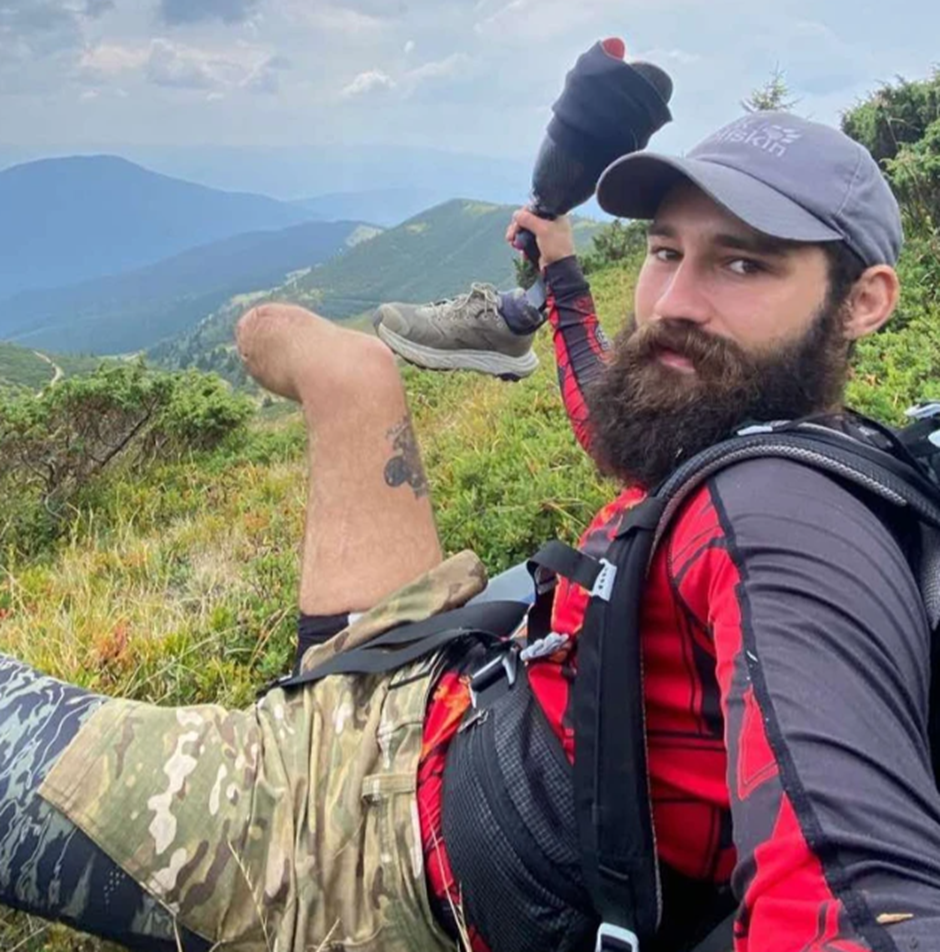
In the summer of 2024, Roman Kolesnik walked over 50 km in the mountains to raise 1,000,000 hryvnia for the army. Photo from Roman's page
Sports camps and veteran teams: how will adaptive sports develop in Ukraine?
This year, Ukraine legally recognized adaptive sports as a separate area of physical culture development in the country. This creates clear state guarantees for veterans with disabilities in terms of access to sports services and opportunities for recovery.
"Every year, veteran adaptive sports are developing faster and faster in Ukraine. At the same time, we need to understand that this is only the beginning of this culture and its systematic development in our country," explains Taras Kovalyk, head of the veteran department of the Come Back Alive Foundation. "In one region, for example, there may be a wheelchair basketball section, but in a neighboring region, there may not be. Therefore, together with the Ministry of Veterans Affairs, we are promoting the idea that sports camps for the rehabilitation of veterans should be set up throughout the country. This would allow veterans to come there to train and learn about different sports under the supervision of professional coaches, with the support of rehabilitation specialists, physical therapists, and psychologists."
In order to implement this idea in a high-quality and systematic manner, we need specialists in the relevant fields and communities willing to find locations for the camps and get involved in their organization.
"Some regions already have the infrastructure in place to host such camps. It is important that local community organizations and veteran communities learn how to organize such camps on their own. And, of course, this requires funding. We are working to ensure that local and national businesses, as well as the international community, see the potential in this type of rehabilitation for Ukrainian veterans and invest resources in it," comments Taras Kovalyk.
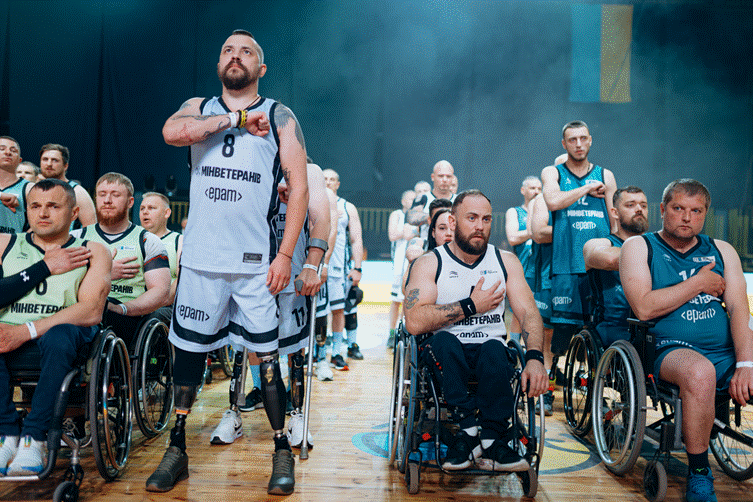
Ukrainian veterans during a wheelchair basketball competition. Photo from the Center for Initiatives PZ website
In addition, the head of the veterans' department of the Come Back Alive Foundation emphasizes the importance of developing team sports for war veterans and adaptive sports:
"Team sports are very good for socializing veterans and bringing new communities together. This year, we are focusing on sitting volleyball and wheelchair basketball. At the end of August, there will be a camp, followed by a wheelchair rugby competition, to which I cordially invite everyone. It will be an incredible celebration of life and incredible emotions! A request to all newcomers: trust us and sign up to participate. We will help, support, and teach you. We will do everything to ensure that you have an unforgettable experience.
And in December, I invite you to a large-scale multi-sport competition. For the first time, sports such as pickleball (combining elements of tennis, badminton, and table tennis) and laser run (combining movement and shooting with a laser pistol) will be widely presented to the veteran community. We are waiting for you!
Where can you find sports clubs and competitions for veterans?
Some cities already have adapted gyms, and many veterans compete fiercely in handball or wheelchair rugby championships.
We have compiled a list of resources where you can easily find your preferred type of activity:
Regional calendar plan for sports competitions and events for war veterans in 2025.
It contains information about planned tournaments, competitions, and training camps.
List of sports facilities operating under the "Veteran Sports" program.
More than 500 facilities accept funds from the state program. This is 1,500 UAH per quarter for classes in gyms or swimming pools. Applications for funds must be submitted through "Diyu" by the 20th day of the first month of the quarter.
The "Nashi Tut" platform from the "Come Back Alive" Initiative Center.
It features an interactive map of locations for veterans' rehabilitation through sports, as well as a calendar of upcoming mountain hikes and camps for veterans organized by the Center.
A unified calendar of sports competitions and events for war veterans for 2025.
Here you will find information about all-Ukrainian and international sports competitions for veterans, including e-sports.
On the Second Wind Club page, you can follow announcements of free water rafting trips and mountain hikes organized by this community for veterans.
Whatever their relationship with sports was before the war, after returning to civilian life, it can become one of the most effective ways for veterans to strengthen their bodies, reintegrate into society, and gain additional support.
You just need to find a sport that will give you both pleasure and motivation.
The information campaign "Opportunities for Veterans" is being implemented as part of a partnership between the Ministry of Veterans Affairs and the Veterans Reintegration Program, which is being implemented by IREX with the support of the US State Department.